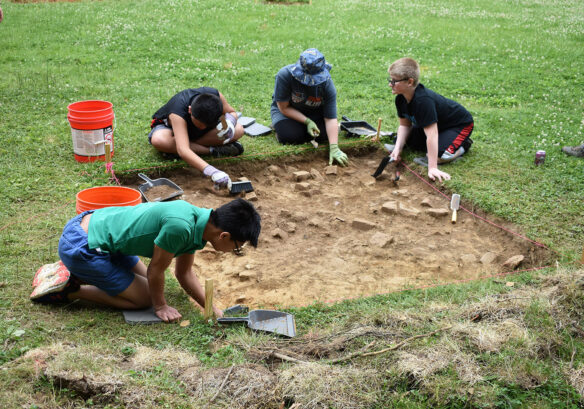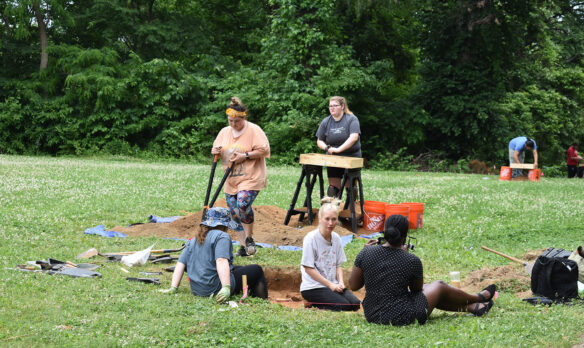
Kentucky School for the Blind (KSB) students excavate the site of the old segregated School for the Blind, located at the back of the KSB campus. The school was demolished in the 1950s after desegregation.
Photo by Shelby Stills, May 18, 2022
Sitting on the ground in front of a pile of dirt in the far back portion of the Kentucky School for the Blind (KSB) campus, 7th-graders Wyatt Wilson and David Yeast began a conversation about the things they expected to dig up and what it means for the future.
“If we dig these things up, we can remind people, ‘Hey, this is what we were, we can change this,’” said Wilson
KSB has partnered with students and faculty from the University of Louisville (UofL) Department of Anthropology and Center for Archaeology and Cultural Heritage, the Kentucky School for the Blind Charitable Foundation (KSBCF) and the Kentucky Department of Education (KDE) for a summer archeological field school.
The month-long project began May 9 and teaches KSB and UofL students archeological field methods as they help uncover the historic schoolhouse of the segregated School for the Blind, opened in 1884 and in operation for 71 years. The school was demolished after desegregation in the 1950s. The project gives KSB students the opportunity to be a part of uncovering their school’s past as they participate in all aspects of the field investigation, from excavation to curation of recovered artifacts.
UofL students are teaching the younger students archeological field methods, like screening and excavating, to uncover the historic schoolhouse. So far, students have found bricks, plates, glass and even a coin.
While many KSB students expressed enthusiasm about the project, it also prompted deep thinking by some, such as Yeast, about what their own experiences might have been like had they attended when the school was segregated.
“It kind of shocks me to think I might have been here if I came in the 1800s,” said Yeast. “I didn’t really think about that until today. I think it’s important that we remember things that happened in the past.”
Wilson said he didn’t know the school had been segregated when he first came to KSB.
“It’s sad to believe my friend would have been in this school back then,” he said.

University of Louisville anthropology students excavate and screen dirt at the site of the the old segregated School for the Blind. Students hope to build a memorial to commemorate the students who lived and worked at the school and put their findings in a museum.
Photo by Shelby Stills, May 18, 2022
For more than 180 years, KSB has provided educational services for students throughout the Commonwealth who are blind or visually impaired. During this time, KSB has developed a rich cultural history, making it a prominent historical landmark in the city of Louisville.
KSB Principal Peggy Sinclair-Morris said the school is excited to partner with the KSBCF and UofL on the archeological dig.
“For our students, this hands-on, unique experience helps them look at, feel and touch history, and to be a part of history in the making. In addition, it supports learning about the field of archeology and the importance of preserving and talking about history,” she said.
Ashley Smallwood, associate professor of anthropology at UofL, said working with KSB students has been a fulfilling experience.
“It has been great seeing these students learn about archeology and be so excited about the process and learn about the history of their campus,” she said. “For many students, this is the furthest they have even walked on their campus, so it has been an adventure for them.”
Kentucky Commissioner of Education Jason E. Glass said the project will be a valuable hands-on learning experience for KSB students.
“This opportunity really hits upon two of the main themes of United We Learn, which is a new vision for the future of public education in the Commonwealth that was created by Kentuckians,” he said. “The central pillar of United We Learn is creating a vibrant experience for every student by making it more hands-on and experiential. It also stresses the importance of our schools and their communities working together.
“This dig gives KSB students the unique opportunity to experience history with their own hands and form strong partnerships with their community through UofL and KSBCF. KDE is grateful to be a part of this special opportunity and we are eager to see what these students are able to uncover.”
KSBCF will be hosting a Community Dig Day for families and community members on May 21 from 10 a.m. to 1 p.m. ET on the KSB campus. Community members will be able to take part in excavation and screening (the process of separating materials from the soil through mesh screens), and hear from one of the last living students from the segregated School for the Blind.



Leave A Comment